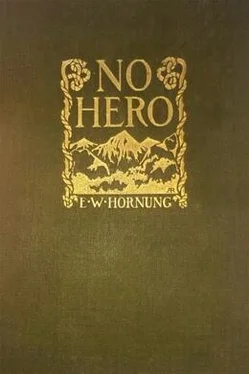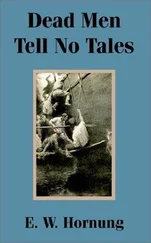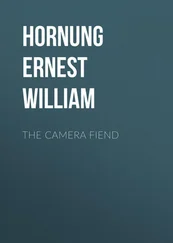Then, last of all, I looked where Quinby had advised me to look, and there sure enough, on the almost deserted terrace, were the couple whom I had come several hundred miles to put asunder. Hitherto I had only realised the distasteful character of my task; now at a glance I had my first inkling of its difficulty; and there ended the premature satisfaction with which I had learnt that there was "something in" the rumour which had reached Catherine's ears.
There was no moon, but the mountain stars were the brightest I have ever seen in Europe. The mountains themselves stood back, as it were, darkling and unobtrusive; all that was left of the Matterhorn was a towering gap in the stars; and in the faint cold light stood my friends, somewhat close together, and I thought I saw the red tips of two cigarettes. There was at least no mistaking the long loose limbs in the light overcoat. And because a woman always looks relatively taller than a man, this woman looked nearly as tall as this lad.
"Bob Evers? You may not remember me, but my name's Clephane—Duncan, you know!"
I felt the veriest scoundrel, and yet the words came out as smoothly as I have written them, as if to show me that I had been a potential scoundrel all my life.
"Duncan Clephane? Why, of course I remember you. I should think I did! I say, though, you must have had a shocking time!"
Bob's voice was quite quiet for all his astonishment, his manner a miracle, though it was too dark to read the face; and his right hand held tenderly to mine, as his eyes fell upon my sticks, while his left poised a steady cigarette. And now I saw that there was only one red tip after all.
"I read your name in the visitors' book," said I, feeling too big a brute to acknowledge the boy's solicitude for me. "I—I felt certain it must be you."
"How splendid!" cried the great fellow in his easy, soft, unconscious voice, "By the way, may I introduce you to Mrs. Lascelles? Captain Clephane's one of our very oldest friends, just back from the Front, and precious nearly blown to bits!"
Mrs. Lascelles and I exchanged our bows. For a dangerous woman there was a rather striking want of study in her attire. Over the garment which I believe is called a "rain–coat," the night being chilly, she had put on her golf–cape as well, and the effect was a little heterogeneous. It also argued qualities other than those for which I was naturally on the watch. Of the lady's face I could see even less than of Bob's, for the hood of the cape was upturned into a cowl, and even in Switzerland the stars are only stars. But while I peered she let me hear her voice, and a very rich one it was—almost deep in tone—the voice of a woman who would sing contralto.
"Have you really been fighting?" she asked, in a way that was either put on, or else the expression of a more understanding sympathy than one usually provoked; for pity and admiration, and even a helpless woman's envy, might all have been discovered by an ear less critical and more charitable than mine.
"Like anything!" answered Bob, in his unaffected speech.
"Until they knocked me out," I felt bound to add, "and that, unfortunately, was before very long."
"You must have been dreadfully wounded!" said Mrs. Lascelles, raising her eyes from my sticks and gazing at me, I fancied, with some intentness; but at her expression I could only guess.
"Bowled over on Spion Kop," said Bob, "and fairly riddled as he lay."
"But only about the legs, Mrs. Lascelles," I explained; "and you see I didn't lose either, so I've no cause to complain. I had hardly a graze higher up."
"Were you up there the whole of that awful day?" asked Mrs. Lascelles, on a low but thrilling note.
"I'd got to be," said I, trying to lighten the subject with a laugh. But Bob's tone was little better.
"So he went staggering about among his men," he must needs chime in, with other superfluities, "for I remember reading all about it in the papers, and boasting like anything about having known you, Duncan, but feeling simply sick with envy all the time. I say, you'll be a tremendous hero up here, you know! I'm awfully glad you've come. It's quite funny, all the same. I suppose you came to get bucked up? He couldn't have gone to a better place, could he, Mrs. Lascelles?"
"Indeed he could not. I only wish we could empty the hotel and fill every bed with our poor wounded!"
I do not know why I should have felt so much surprised. I had made unto myself my own image of Mrs. Lascelles, and neither her appearance, nor a single word that had fallen from her, was in the least in keeping with my conception. Prepared for a certain type of woman, I was quite confounded by its unconventional embodiment, and inclined to believe that this was not the type at all. I ought to have known life better. The most scheming mind may well entertain an enthusiasm for arms, genuine enough in itself, at a martial crisis, and a natural manner is by no means incompatible with the cardinal vices. That manner and that enthusiasm were absolutely all that I as yet knew in favour of this Mrs. Lascelles; but they were enough to cause me irritation. I wished to be honest with somebody; let me at least be honestly inimical to her. I took out my cigarette–case, and when about to help myself, handed it, with a vile pretence at impulse, to Mrs. Lascelles instead.
Mrs. Lascelles thanked me, in a higher key, but declined.
"Don't you smoke?" I asked blandly.
"Sometimes."
"Ah! then I wasn't mistaken. I thought I saw two cigarettes just now."
Indeed, I had first smelt and afterward discovered the second cigarette smouldering on the ground. Bob was smoking his still. The chances were that they had both been lighted at the same time; therefore the other had been thrown away unfinished at my approach. And that was one more variation from the type of my confident preconceptions.
Young Robin had meanwhile had a quick eye on us both, and the stump of his own cigarette was glowing between a firmer pair of lips than I had looked for in that boyish face.
"It's so funny," said he (but there was no fun in his voice), "the prejudice some people have against ladies smoking. Why shouldn't they? Where's the harm?"
Now there is no new plea to be advanced on either side of this eternal question, nor is it one upon which I ever felt strongly, but just then I felt tempted to speak as though I did. I will not now dissect my motive, but it was vaguely connected with my mission, and not unrighteous from that standpoint. I said it was not a question of harm at all, but of what one admired in a woman, and what one did not: a man loved to look upon a woman as something above and beyond him, and there could be no doubt that the gap seemed a little less when both were smoking like twin funnels. That, I thought, was the adverse point of view; I did not say that it was mine.
"I'm glad to hear it," said Bob Evers, with the faintest coldness in his tone, though I fancied he was fuming within, and admired both his chivalry and his self–control. "To me it's quite funny. I call it sheer selfishness. We enjoy a cigarette ourselves; why shouldn't they? We don't force them to be teetotal, do we? Is it bad form for a lady to drink a glass of wine? You mightn't bicycle once, might you, Mrs. Lascelles? I daresay Captain Clephane doesn't approve of that yet!"
"That's hitting below the belt," said I, laughing. "I wasn't giving you my opinion, but only the old–fashioned view of the matter. I wish you'd take one, Mrs. Lascelles, or I shall think I've been misunderstood all round!"
"No, thank you, Captain Clephane. That old–fashioned feeling is infectious."
"Then I will," cried Bob, "to show there's no ill–feeling. You old fire–eater, I believe you just put up the argument to change the conversation. Wouldn't you like a chair for those game legs?"
Читать дальше










